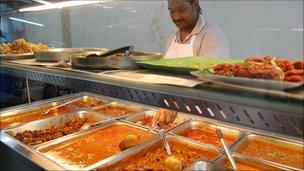Malaysian business' labour dilemma
- Published
Watch: Jennifer Pak reports from an Indian restaurant in Malaysia
Business may seem brisk at the Abirami restaurant. Over the course of a day, chef Kanesan will roll out a couple of hundred roti canai, a Malaysian-Indian flat bread, to feed the steady stream of office workers and families.
He spends much of his 16-hour shift on his feet because the restaurant is short staffed.
These are tough times for Indian eateries in Malaysia, who mainly rely on staff from India.
Over the last year the Abirami restaurant chain has closed down five of its seven locations because of a shortage of foreign workers.
Shanmuganathan Rajagopalan, the manager, says the immigration department has rejected many of their applications for more workers from India.
The government has been under pressure to allow fewer low-skilled foreign workers into the country. These workers have been blamed for keeping wages low and hampering Malaysia's aspirations to become a high-income economy.
Reducing numbers
In its latest five-year economic plan, the government pledged to decrease its reliance on this migrant work force by making it more difficult and expensive for businesses to employ them.
Many Indian restaurants say this is crippling their business.
They recently asked the government to allow them to recruit 90,000 foreign workers, mainly from India.

Speciality outlets like Indian restaurants rely heavily on foreign labour in Malaysia
The Human Resources Ministry has said the government will only approve half that number, but that decision is still being reviewed.
There is a resistance from union groups who say the jobs should go to locals, but employers say Malaysians do not want these jobs.
Vediappan, 40, from India, is known as the "sweets master" at Abirami restaurant. He gets paid 1800 ringgit ($600; £372) a month because he was formally trained in school to make Indian desserts.
It is an unusually high salary for a migrant worker, yet it is one that many Malaysians would find too small to survive on. Many would also struggle to put in as many hours as much as Vediappan, who works six days a week with few breaks in-between.
It is difficult to hire Malaysians in the Indian restaurants because of the long working hours and low pay, according to Mr Shanmuganathan. "They also look down on this type of work," he adds.
One of his staff, Selvam, 34, is ashamed to tell his family in India that he is working in a restaurant, but he has no intention of leaving Malaysia because he earns three times more than he would do working as a driver in his hometown.
The money Selvam sends back home is enough to support his wife, parents and grandfather. Like many workers in the restaurant, he is the sole breadwinner in his family.
"I have better opportunities here," he says.
Protecting rights

Industries like palm oil and construction are some of the biggest employers of foreign labour in Malaysia
Reducing the reliance on cheap labour is not the only problem that the government is facing.
There are hundreds of thousands more who have entered the country illegally. The United Nations Human Development Report in 2009 estimated that there were about 600,000 illegal migrants in Malaysia.
Human rights activists estimate that the figure is much higher.
Increasingly the government is under pressure to better protect the rights of migrant workers. In a scathing report released last year, Amnesty International found there was widespread exploitation of migrants in Malaysia.
Foreign workers are covered by employment laws in principle.
But the report found that there is a lack of effective enforcement and an over-dependence of foreign workers on their employers, which means migrants "have few or no safeguards against abuse".
In most cases migrants do not get paid for a few months, sometimes years, says Irene Fernandez from the migrant rights group Tenaganita.
When workers try to leave their employers, their work status is often cancelled and they become illegal in Malaysia, she says. If caught, the criminal penalties range from fines, imprisonment to caning.
Ms Fernandez calls this system of control "a modern form of slavery."
She has called for the government to set a minimum wage so that there is no discrimination between Malaysian and migrant workers.
Policy concerns
This tension between businesses and the government was identified by the National Economic Advisory Council. It stated that Malaysia has lacked a coherent policy on foreign workers since the 1990s.
The council credits the influx of millions of migrants for helping to move Malaysia from a backwater economy dependent on tin and rubber, into a trading nation largely driven by cheap exports.
Now, the government acknowledges that this low-cost labour pool has delayed investment in various sectors, leaving the country caught in the middle-income trap.
But small restaurant operators, such as Mr Shanmuganathan, says restaurants should be exempt from restrictions of foreign workers because of their low profit margin.
"You cannot do away with migrant workers altogether," says Mr Shanmuganathan.
"Other industries may be able to shift to machines and innovate in other ways, but you cannot automate much in the restaurant business.
"You still need people to go into the kitchen and cook."